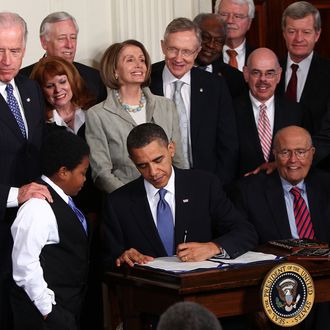
The Washington Post has an apparent blockbuster story today. It reports that a new study finds that Obamacare will increase the budget deficit, not decrease it, as the Congressional Budget Office has found:
>President Obama’s landmark health-care initiative, long touted as a means to control costs, will actually add more than $340 billion to the nation’s budget woes over the next decade, according to a new study by a Republican member of the board that oversees Medicare financing.
That sounds pretty legit, right?
Actually, no. It’s not even remotely legit.
That sounds pretty legit, right?
Actually, no. It’s not even remotely legit.
The first thing to understand here is that this is not a study by a government agency. It’s a paper by Charles Blahous. Who is Charles Blahous? He’s a Republican policy guy. By tradition, the president appoints a member of each party to serve as a trustee of Medicare and Social Security. Blahous, who served under George W. Bush and was active in his attempt to introduce private accounts into Social Security, is the Republican trustee. But the other trustee, Robert Reischauer, has zero to do with his paper. It was published by the Mercatus Center, a Koch-funded organization that produces some quality work as well as a fair amount of schlock that does not meet the standards of your typical university economics paper. This paper is an example of the latter.
The Affordable Care Act spends a bunch of money to cover people who are too poor or sick to afford their own health care. To pay for that, it raises some taxes and cuts a bunch of spending from Medicare. The new revenue and the spending cuts outweigh the cost of the new spending, which is why the Congressional Budget Office projected it to reduce the deficit. Projections always have a margin for error attached, but the CBO’s two year update actually bumped up the savings projections a bit.
You may wonder what methods Blahous used to obtain a more accurate measure of the bill’s cost. The answer is that he relies on a simple conceptual trick. Medicare Part A has a trust fund. By law, the trust fund can’t spend more than it takes in. So Blahous assumes that, when the trust fund reaches its expiration, it would automatically cut benefits.
The assumption is important because it forms the baseline against which he measures Obama’s health-care law. He’s assuming that Medicare’s deficits will automatically go away. Therefore, the roughly $500 billion in Medicare savings that Obama used to help cover the uninsured is money that Blahous assumes the government wouldn’t have spent anyway. Without the health-care law, in other words, we would have had Medicare cuts but no new spending on the uninsured. Now we have the Medicare cuts and new spending on the uninsured. Therefore, the new spending in the law counts toward increasing the deficit, but the spending cuts don’t count toward reducing it.
That is a completely bizarre assumption. It’s not an assumption that any scoring agency ever applies in other situations. We assume that, in the absence of action, Congress will keep paying Medicare benefits. That’s why we have all these projections of future deficits. If Blahous’s assumptions are right, then we don’t really have an entitlement problem at all. Medicare can’t exceed its trust fund, so problem solved! You know how Paul Ryan has been stalking the halls of Congress with disaster-movie music in the backdrop, warning that we’re about to become Greece? He should relax! (Also, Blahous’s methodology would show that Ryan’s budget looks way worse, too.)
Anyway, that’s the trick. Assume the Medicare savings don’t count because Medicare would have reduced its payments anyway, and boom — Obamacare now increases the deficit.
There actually is a bit more in the paper, but it’s even less persuasive. Blahous suggests that Congress might roll back some of the cost savings in the law. And yes, of course that’s a risk — Republicans are trying to repeal the entire law. If Congress repeals some of the cost savings, then they won’t save money.
That’s not a way of saying Obamacare will drive up the deficit, it’s a way of saying that future legislation will drive up the deficit. In 1993, Bill Clinton hiked taxes on the rich. You could have pointed out at the time that his plan raised less revenue than forecast because there was a chance that eventually people who hate taxes on the rich would take control of the government and roll back his tax hike. That is, in fact, what eventually happened. But it would be exceedingly odd to frame such an observation as “Clinton’s tax cut won’t raise as much revenue as we think.”






























